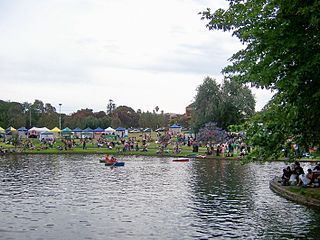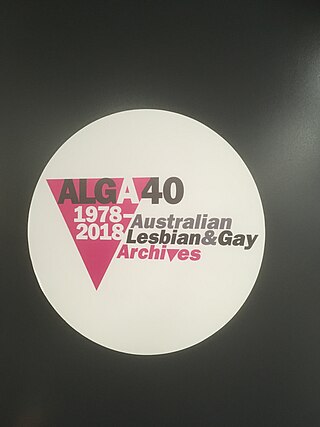
The Sydney Gay and Lesbian Mardi Gras or Sydney Mardi Gras is an event in Sydney, New South Wales attended by hundreds of thousands of people from around Australia and overseas. One of the largest LGBT festivals in the world, Mardi Gras is the largest Pride event in Oceania. It includes a variety of events such as the Sydney Mardi Gras Parade and Party, Bondi Beach Drag Races, Harbour Party, the academic discussion panel Queer Thinking, Mardi Gras Film Festival, as well as Fair Day, which attracts 70,000 people to Victoria Park, Sydney.
Singapore's first public LGBT pride festival, IndigNation, took place during the month of August in 2005, with a second annual IndigNation in August 2006. Previous gay celebrations, exemplified by the Nation parties held annually in Singapore since 2001, were private commercial events held for LGBT recreation, but were also socio-political statements of significance in Singapore gay history and milestones in Singapore's human rights record.
The Hero Parade was an (almost) annual gay and lesbian parade in Auckland, New Zealand which operated from 1992-2001. It was part of the Hero Festival. The Hero Parade and Festival usually took place in February, a week or two ahead of the Sydney Gay and Lesbian Mardi Gras.
Pride Scotia was Scotland's national community-based LGBT Pride festival alternating between the cities of Edinburgh and Glasgow, held in June from its beginnings in 1995 until 2008, when it split into separate organisations.

Feast Festival is an LGBTI Festival held annually in the South Australian capital of Adelaide. The event is one of Australia's four major queer festivals, alongside Perth's Pride Festival, Melbourne's Midsumma and the Sydney Gay and Lesbian Mardi Gras.

Manchester Pride is a charity that campaigns for LGBTQ+ equality across the United Kingdom, predominantly in Greater Manchester. The Charity offers dialogue, training, research and policy analysis, advocacy and outreach activities focusing on LGBTQ+ rights.

WorldPride is a series of international LGBT pride events coordinated by InterPride; they are hosted in conjunction with local LGBT pride festivals, with host cities selected via bids voted on during InterPride's annual general meetings. Its core events include opening and closing ceremonies, a pride parade, and an LGBT human rights conference.

The Australian Queer Archives (AQuA) is a community-based non-profit organisation committed to the collection, preservation and celebration of material reflecting the lives and experiences of lesbian, gay, bisexual, transgender and intersex LGBTI Australians. It is located in Melbourne. The Archives was established as an initiative of the 4th National Homosexual Conference, Sydney, August 1978, drawing on the previous work of founding President Graham Carbery. Since its establishment the collection has grown to over 200,000 items, constituting the largest and most significant collection of material relating to LGBT Australians and the largest collection of LGBT material in Australia, and the most prominent research centre for gay, lesbian, bisexual, trans and intersex history in Australia.

The Sydney Gay and Lesbian Holocaust Memorial Project was founded by a group of community activists. Over the years they raised funds and decided, with South Sydney City Council, on the site at Green Park in Darlinghurst, in Sydney, Australia. Darlinghurst is considered the heart of Sydney's gay and lesbian population. Green Park is adjacent to the Sydney Jewish Museum, which ensures that the memorial retains its historic meaning.
David McDiarmid (1952–1995) was an artist, designer and political activist, recognised for his prominent and sustained artistic engagement in issues relating to gay male identity and HIV/AIDS. He is also known for his involvement in the gay liberation movement of the early 1970s, when he was the first person arrested at a gay rights protest in Australia, as well as his artistic direction of the Sydney Gay and Lesbian Mardi Gras. From its inception, McDiarmid's art career encompassed, as both subject and inspiration, gay male sexuality, politics and urban subcultures. His creative techniques included: collage, painting, drawing, calligraphy, mosaic, installation, various forms of print-making, sculpture and artist's books. He was a graphic designer, designer and fabric painter for women's and men's fashion, and an artist and creative director for the Sydney Gay and Lesbian Mardi Gras street parades.

Mark Alsop is an Australian DJ and remixer. Alsop is one of the longest-continuous working DJs in Australia. He predominantly plays house music and tends to play at gay dance parties, bars and clubs. Specific genres played include electro house, progressive house, deep house, and vocal house as well as retro and soulful house tunes.
Dayenu is an LGBTQ+ organisation based in Sydney, Australia. The word Dayenu means "enough" in Hebrew, and the group uses it to mean that they have had "enough" of homophobia.

Pride Cymru is an LGBT pride festival held annually in Cardiff, Wales.
Sydney's Pride History Group was established as the first volunteer community group dedicated exclusively to preserving the history of LGBTIQ Sydney predominantly through the collection of oral history interviews. The Group's origins date from discussions held at the Sydney Pride Centre in between 2003 and 2004. The Group's Patrons are Sydney Lord Mayor Clover Moore, artist William Yang and Meredith Burgmann.
C. Moore Hardy , is an Australian photographer, nurse and community worker, known for her extensive photographic documentation of the Sydney queer community since the late 1970s. Hardy's work has encompassed both freelance and commercial photography, featuring candid portraiture of community events, most notably the Sydney Gay and Lesbian Mardi Gras, and in particular minority groups within the LGBTI community. She successfully ran Starfish Studio Photography Studio/Gallery in Clovelly, NSW for 15 years. Hardy held a major exhibition of over three decades of her documentation of Sydney's LGBTQ+ scene at the National Art School in Sydney.
This is a timeline of notable events in the history of the lesbian, gay, bisexual and trans community in Manchester.
Ron Austin was an Australian LGBT rights activist, who was known for being one of the founders of the Sydney Gay and Lesbian Mardi Gras in 1978.
Lance Gowland (1935–2008) was an Australian LGBT rights activist, unionist, peace activist and Communist Party member. He was a member of the Campaign Against Moral Persecution (CAMP) and as one of the organisers drove the truck in the first Sydney Gay and Lesbian Mardi Gras.
The Campaign Against Moral Persecution was an LGBT activism group. It was officially established on 6 February 1971, at the first public gathering of gay women and men in Australia, which took place in a church hall in Balmain, New South Wales.

The LGBT community of Sydney, in New South Wales, is the largest in Australia and has a firm place as one of the iconic gay cities of the contemporary world. In a 2013 Pew Research poll, 79% of Australians agreed that homosexuality should be accepted by society, making it the fifth most supportive country in the survey behind Spain (88%), Germany (87%), Canada and the Czech Republic. With a long history of LGBT rights activism and the annual three-week-long Sydney Gay and Lesbian Mardi Gras festival, Sydney is one of the most gay-friendly cities in Australia and in the world.








